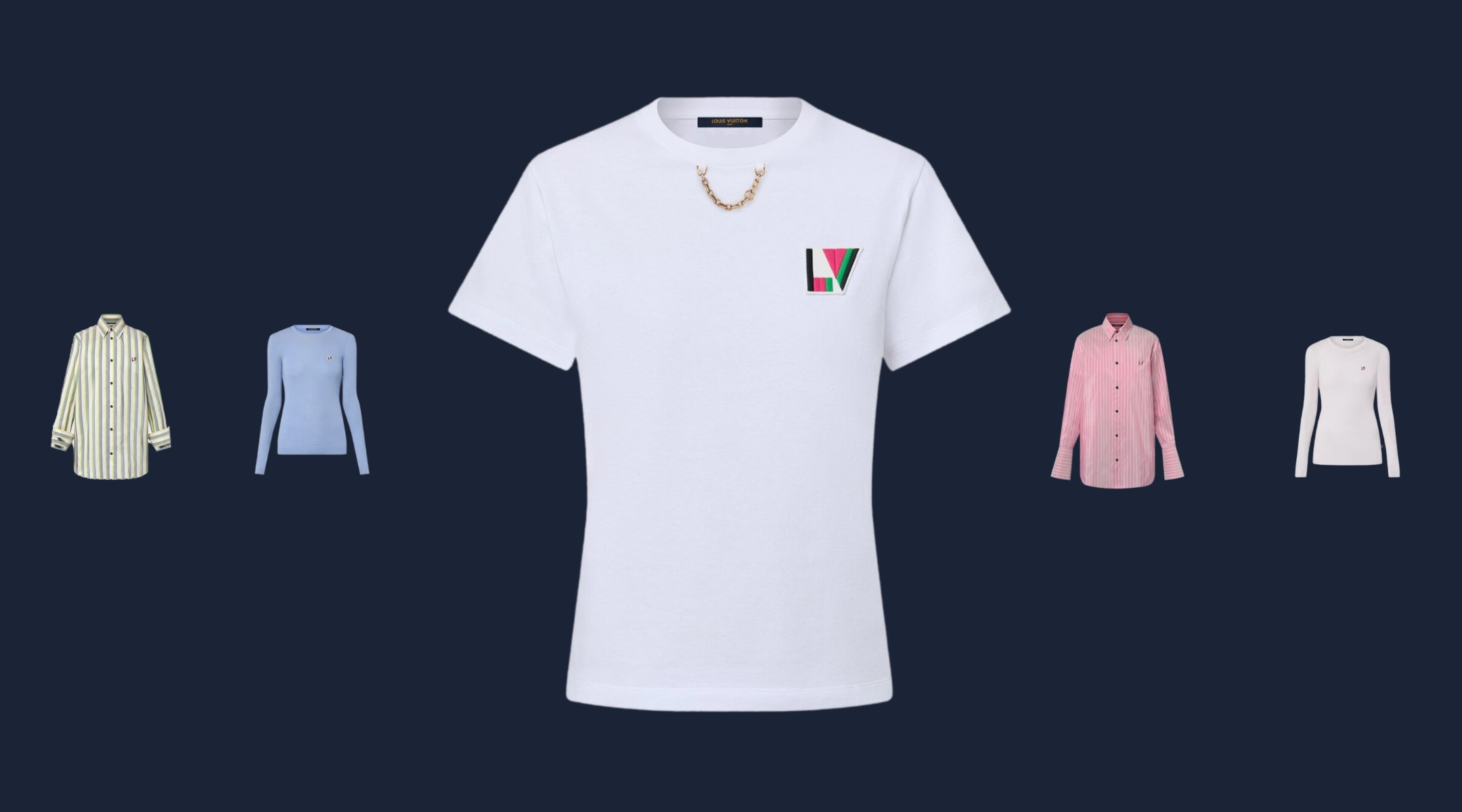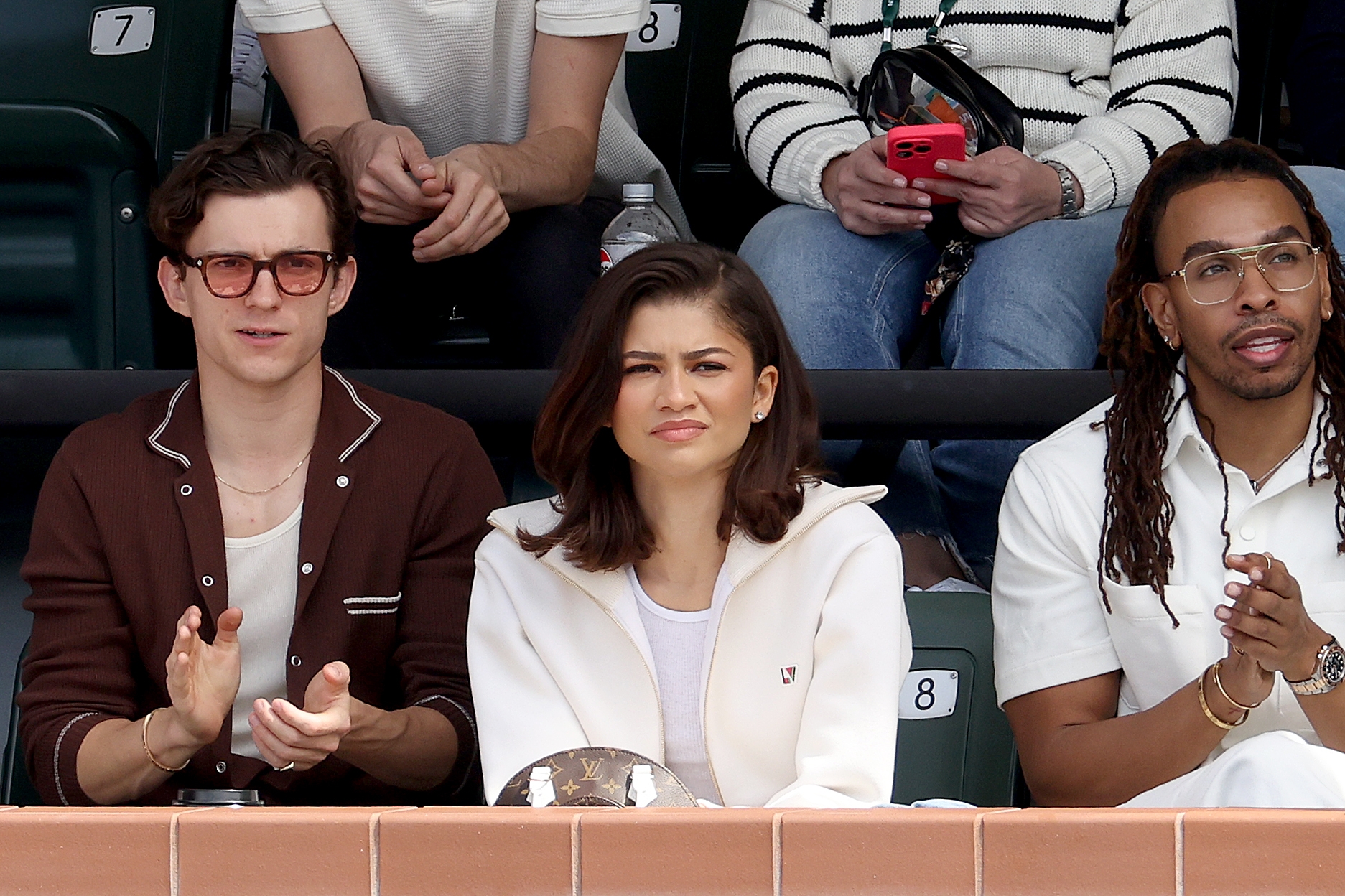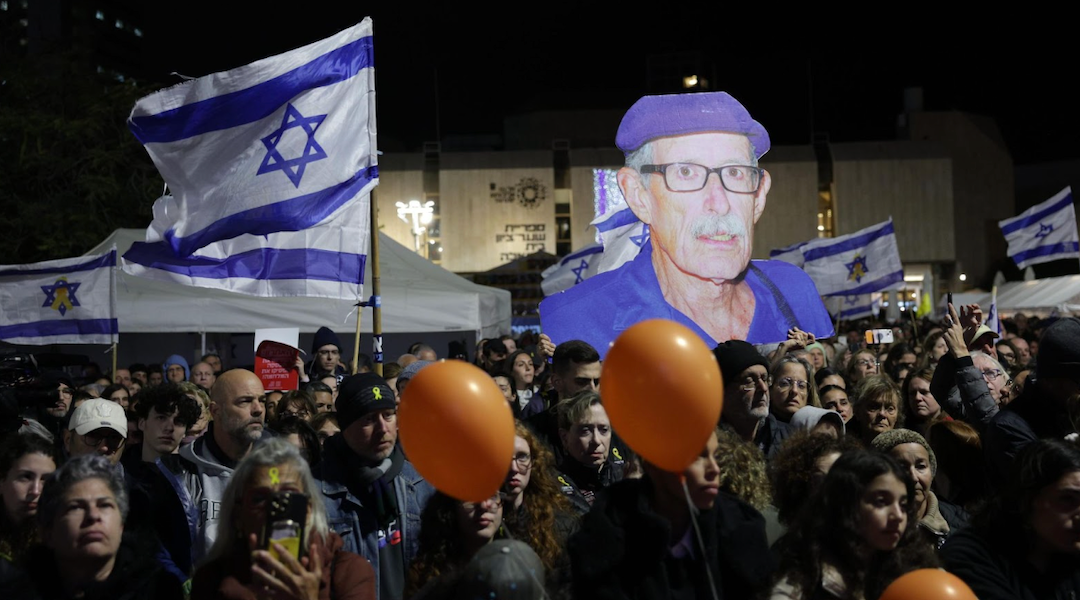Is Louis Vuitton selling pro-Palestinian T-shirts for $800? Social media and fashion industry norms are divided.
Nicolas Ghesquière, Louis Vuitton’s creative director since 2013, is sometimes credited with popularizing the keffiyeh as a fashion item

The LV logo patch is on multiple spring/summer 2024 womenswear items from French fashion house Louis Vuitton.(Screenshots via LouisVuitton.com. Design by Jackie Hajdenberg)
(JTA) — Is Louis Vuitton really taking sides in the Israel-Hamas war by selling an $820 T-shirt with a graphic logo in the colors of the Palestinian flag?
Some people on both sides of the Israeli-Palestinian conflict believe the answer is yes, after a shirt with the LV logo in magenta, green, black and white hit shelves — and social media — this week.
Critics of the shirt say the colors in the logo appear to have been drawn from the colors of the Palestinian flag or a watermelon, an emergent symbol of Palestinian nationalism given its color.
Some have associated it with an inverted red triangle, a symbol sometimes used in the form of an emoji that the Anti-Defamation League’s Hate Crimes Database says sometimes refers to general pro-Palestinian support, but can also indicate support for violent resistance against Israel because Hamas uses red triangles to indicate Israeli targets in propaganda videos it releases to the public.
An image of the shirt circulated in Jewish social media groups and on antisemitism awareness accounts earlier this week, causing some Jewish users to fret that a major luxury brand has taken a pro-Palestinian stance in the war. Some have sworn never to buy from Louis Vuitton again, saying that the shirt extends a troubling track record for the brand that includes its founding family’s material support for Nazi collaborators in France during the Second World War.
Representatives from LVMH, the conglomerate that owns Louis Vuitton, did not respond to multiple requests for comment. But there is evidence that the design predates the current war, which began when Hamas attacked Israel on Oct. 7.
The shirts are part of Louis Vuitton’s womenswear spring/summer 2024 line, and the patches made an appearance at Paris Fashion Week on Oct. 2, 2023, in an alternate colorway — yellow, black, and red. Such design choices, industry insiders say, are typically made about a year or more ahead of the runway show, especially for larger labels, and the shows themselves are often planned about six months in advance. What appears on the runway is not always exactly the same as what appears in stores, often showcasing a more exaggerated version of that collection’s theme. As an example, two colorways for a tiered Louis Vuitton skirt, shown on the spring/summer 2024 runway, one in red, black, green and white and another in yellow and pink, are not available online, but similar ones appear in pink, black and white, blue-check and white.
Lizzy Savetsky, a Jewish influencer in New York City who debuted an Israeli-flag parody of the shirt on her Instagram account, said she was taken aback by the design of the Louis Vuitton shirt — and by the company’s decision to keep it on sale.
“I do think that having the watermelon on an item of clothing right now is extremely triggering for all of us, just because we’ve seen the watermelon be used for pro-Palestinian propaganda repeatedly,” Savetsky told the Jewish Telegraphic Agency.
“I don’t believe it was intentioned to be that,” she said. “But I think it’s insensitive of the brand to continue to sell it. But with all of that said, the truth is, I just, in these times, have to make light of things because everything has been so heavy and so serious.”
Savetsky also has her own collection of children’s clothing. She said the designs for the products are made almost a year in advance — but that if she had produced something that landed differently once it was ready for purchase, she would withdraw it.
“I know that if I was to make something that became a political statement that was triggering, I wouldn’t sell it,” Savetsky said. “But that’s just me personally. And something as innocuous as a watermelon has now come to mean something much more serious. And the thing that I do take issue with is that the pro-Palestinian crowd is taking it to mean that Louis Vuitton is pro-Palestinian, even though they’re not. And it’s just not a good look.”
For some pro-Palestinian supporters, the shirts read as a cynical statement on the war, one designed to capture profits rather than demonstrate genuine solidarity. Some pro-Palestinian advocates have previously called for a boycott on LVMH brands, citing CEO Bernard Arnauld’s substantial investments in a Israeli cloud-based security company Wiz. (The company is not on the official Boycott, Divestment, and Sanctions movement list.)
“Wretched people who want to profit from other people’s pain,” wrote one Facebook user in a public comment, referring to Louis Vuitton. “If they really had a pro-Palestinian position, the ideal would be to establish that position with a real statement of their position. Not with stupid hidden signs. This is not the time for stupidity, there is a genocide and every human being must openly condemn it.”
<img class=”size-full wp-image-1857346″ src=”https://www.jta.org/wp-content/uploads/2024/03/Screen-Shot-2024-03-22-at-12.08.13-PM.png” alt=”” width=”2798″ height=”1336″ /> A shirt with a logo that some say resembles symbols of Palestinian support remains for sale on Louis Vuitton’s website as of March 22, 2024. (Screenshot)
For some observers, the online discourse over the patches is the biggest concern.
“It really is time people start addressing this stuff beyond side discussions on Twitter. This is a QAnon-style conspiracy theory,” Elad Nehorai, a progressive Jewish activist who frequently comments on misinformation, wrote on X, formerly Twitter, on Tuesday. “That’s not an exaggeration. It’s pure fantasy. And it is becoming more and more common in this propaganda war. Very dangerous stuff.”
The frenzy over the patches is not the first time Louis Vuitton has found itself as a sartorial flashpoint of the Israeli-Palestinian conflict. In June 2021, about a month after a spate of violence between Israel and Hamas that left nearly 300 people, mostly Palestinians, dead, the brand sold a blue and white “Monogram Keffieh Stole,” which it described as “inspired by the classic Keffieh and enriched with House signatures.” The keffiyeh is a traditional Arab headdress, usually made from cotton, that has become a symbol of Palestinian nationalism and solidarity over the course of the 20th century, in which the different colors woven into the cloth can indicate the wearer’s political affiliations. The product was yanked amid a backlash from both pro-Israel voices and supporters of the Palestinians, who said the colors — the same as those in the Israeli flag — made it seem like a pro-Israel product.
Nicolas Ghesquière, Louis Vuitton’s creative director since 2013, is sometimes credited with popularizing the keffiyeh as a fashion item in the 2000s.
The latest kerfuffle has come with a mystery. An unbylined Israeli report published earlier this week paraphrased the CEO of Louis Vuitton as having said that the design was an “unintended coincidence” and “steps are being taken to remove it from sale.” But that report has since been deleted and it incorrectly cited the former CEO of LVMH Fashion Group Sidney Toledano as the CEO of Louis Vuitton. (Louis Vuitton has been headed by Pietro Beccari since 2023). Toledano, who is Jewish, moved to an advisory role in February, and Michael Burke, former chief of Louis Vuitton, became chairman and CEO of LVMH’s Fashion Group. Louis Vuitton is one of the approximately 75 brands under luxury conglomerate LVMH, which also owns Moët & Chandon, Dior, Hennessy, Celine, Sephora, Tiffany & Co., TAG Heuer, and others.

Celebrities Tom Holland and Zendaya watch Carlos Alcaraz of Spain play Daniil Medvedev of Russia during the men’s final of the BNP Paribas Open at Indian Wells Tennis Garden on March 17, 2024 in Indian Wells, California. (Matthew Stockman/Getty Images)
The shirts are still available online and in stores — and the celebrity Zendaya recently wore a $3,650 Louis Vuitton jacket with the same logo to a tennis match in California.
For some people paying close attention to the discourse, the dustup is unsurprising given the state of the war but also confounding.
“My experience is people use their own personal frame of reference and apply that to everything around them, which often results in jumping to incorrect conclusions and making reaches — which is exactly what happened with the ‘pro Israel keffiyeh,’ and perhaps what is happening now,” Yehudit Elisheva Eliyahu, posted on Facebook in response to another user’s critical post about the T-shirts.
“It is exactly the same type of situation. The shirt also doesn’t look like a watermelon at all as watermelon doesn’t have black rind,” said Eliyahu, who lives in Jerusalem and allowed JTA to use her comments from a private Facebook group. “Why would Louis Vuitton make a secret pro-Palestinian shirt or a secret pro-Israel keffiyeh and not tell anyone that’s what they are doing?”
This article originally appeared on JTA.org.
A message from our Publisher & CEO Rachel Fishman Feddersen

I hope you appreciated this article. Before you go, I’d like to ask you to please support the Forward’s award-winning, nonprofit journalism so that we can be prepared for whatever news 2025 brings.
At a time when other newsrooms are closing or cutting back, the Forward has removed its paywall and invested additional resources to report on the ground from Israel and around the U.S. on the impact of the war, rising antisemitism and polarized discourse.
Readers like you make it all possible. Support our work by becoming a Forward Member and connect with our journalism and your community.
— Rachel Fishman Feddersen, Publisher and CEO



























